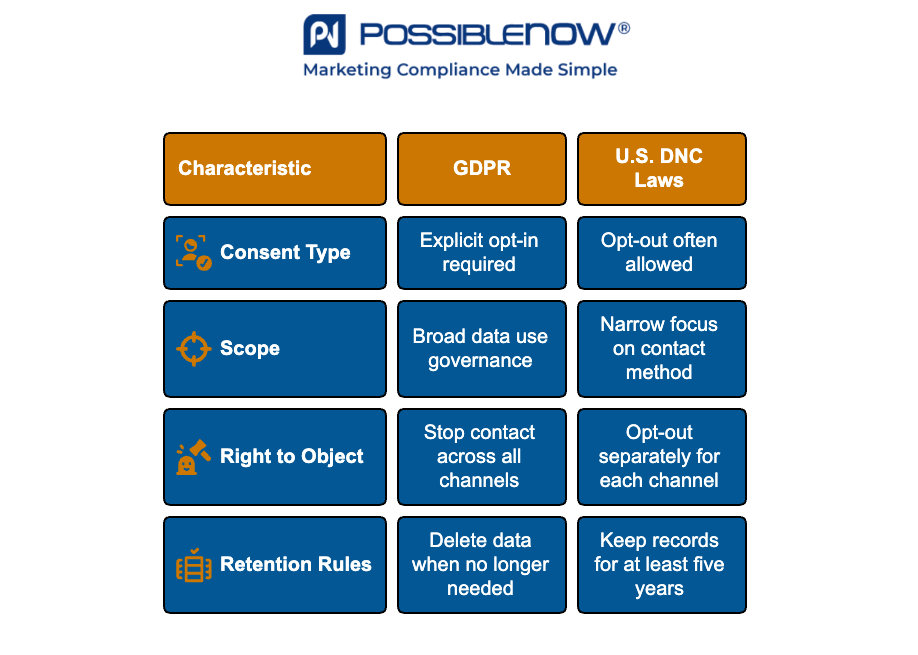Resource Center
The Impact of GDPR on DNC Requirements
Type: Blog
Topic: Do Not Call Solution

The General Data Protection Regulation (GDPR) is the European Union’s comprehensive privacy law that governs how businesses collect, store, and use the personal data of EU residents. It applies to any organization that handles the personal data of individuals in the EU, even if the company is based outside Europe. That includes many U.S. companies with global audiences, digital marketing operations, or cross-border sales strategies.
Here are strategies your business can use to stay compliant with GDPR while continuing to reach customers effectively:
- Obtain freely given, specific, and unambiguous consent for contact
- Stop communication immediately if consent is withdrawn or an objection is raised
- Maintain accurate records of consent, revocation, and contact preferences
- Use centralized systems to manage opt-ins and opt-outs across channels
- Coordinate compliance practices across global teams and vendors
In the following sections, you’ll find information on:
Speak With an Expert Today
Key GDPR Requirements
The GDPR sets a high bar for lawful communication. Key requirements relevant to marketing outreach include:
- Consent must be explicit and separate from other terms or services. No pre-checked boxes or bundled consents are allowed.
- The right to object gives individuals the ability to stop receiving direct marketing at any time.
- Data minimization requires collecting only the data necessary for a specific purpose, including contact permissions.
- Revocation must be easy and effective. Businesses must act promptly once a person opts out or objects.
- Recordkeeping obligations require companies to log consent details, revocation actions, and the legal basis for each communication.
These rules apply to all outreach, including email, SMS, and even voice calls if personal data is involved.
The Differences Between GDPR and U.S. DNC Laws

Both the GDPR and U.S. DNC laws such as the Telephone Consumer Protection Act (TCPA) and the FTC’s Telemarketing Sales Rule (TSR) regulate aspects of contact behavior, but the GDPR does so through the lens of data rights and consent, whereas the TCPA and TSR focus more on the mechanics and rules of outreach itself. Differences include:
- Consent Type: The GDPR typically requires explicit opt-in consent for marketing purposes. In contrast, U.S. laws like the TCPA often allow marketing communications to be sent until the recipient opts out (though stricter opt-in rules apply to automated calls and texts).
- Scope: U.S. laws like the TCPA and TSR have a narrower focus on how contact is made, such as when calls or texts can be sent. GDPR has a broader scope, governing whether you are allowed to use someone’s personal data for outreach in the first place.
- Right to Object: Under GDPR, when an individual objects to direct marketing, the business must stop contacting them across all channels. In the U.S., consumers must opt out separately for each channel—like email, text, or phone—based on the specific law that governs that type of communication.
- Retention Rules: The TSR requires businesses to keep internal Do Not Call records for at least five years. GDPR doesn’t set a fixed timeline but requires businesses to delete personal data when it’s no longer needed for the original reason it was collected.
Risks of Non-Compliance With GDPR
Failure to comply with the GDPR can lead to serious consequences:
- Fines: Up to €20 million or 4% of global annual revenue, whichever is higher
- Complaints and Investigations: Data subjects can file complaints that trigger audits by EU authorities
- Reputational Damage: Mishandling consent or ignoring revocation requests can lead to public backlash and customer loss
- Data Processing Restrictions: Authorities may limit or ban your ability to continue processing personal data
Steps to Stay Compliant With GDPR
To avoid risk and maintain contact compliance across jurisdictions, businesses should:
- Collect consent through GDPR-compliant forms that separate consent from other terms and explain how the data will be used
- Honor opt-outs and objections immediately and across all systems
- Log all consent and suppression activity with time stamps and source attribution
- Audit vendor and partner practices to verify they also follow GDPR standards
- Implement centralized preference management tools that synchronize data across departments and communication platforms
These steps are critical for both legal compliance and customer trust.
How PossibleNOW Can Help
Managing DNC and consent compliance across borders and communication channels requires tools that can handle scale, complexity, and evolving regulations.
PossibleNOW offers a comprehensive platform to help you align your outreach strategy with GDPR and other global privacy laws:
- Our Do Not Call solution handles real-time list scrubbing across national and internal DNC lists, helping you avoid restricted contacts before messages are sent.
- Our TCPA compliance tools support audit-ready documentation of consent, automate suppression processing, and provide real-time integrations with your CRM and outbound systems.
- With MyPreferences®, you can centralize opt-in and opt-out management across email, SMS, voice, and web for consistent compliance with GDPR and similar privacy laws.
To see how PossibleNOW can help your team simplify GDPR compliance while maintaining effective outreach, contact us to schedule a consultation.
Request a Demo Today
About PossibleNOW
PossibleNOW is the pioneer and leader in customer consent, preference, and regulatory compliance solutions. We leverage our MyPreferences technology, processes, and services to enable relevant, trusted, and compliant customer interactions. Our platform empowers the collection, centralization, and distribution of customer communication consent and preferences across the
enterprise. DNCSolution addresses Do Not Contact regulations such as TCPA, CAN-SPAM and CASL, allowing companies to adhere to DNC requirements, backed by our 100% compliance guarantee.
PossibleNOW’s strategic consultants take a holistic approach, leveraging years of experience when creating strategic roadmaps, planning technology deployments, and designing customer interfaces. PossibleNOW is purpose-built to help large, complex organizations improve customer experiences and loyalty while mitigating compliance risk.
-
TCPA Regulations and Compliance: Complete Guide
Type: Blog
Topic: Do Not Call Solution
-
Defining Meaningful Metrics: 6 Soft KPIs to Measure Customer Preference Collection
Type: Blog
Topic: Preference Mgmt
-
Email Preference Center Best Practices
Type: Blog
Topic: Preference Mgmt
-
The Basics of DNC Scrubbing: What Is a Do Not Call (DNC) Scrubber and Why Do You Need It?
Type: Blog
Topic: Do Not Call Solution
-
What is Consent Management, How it Works, & Why it’s Important for Data Compliance
Type: Blog
Topic: Consent Mgmt
-
Do Insurance Companies Cover TCPA Damages?
Type: Blog
Topic: Do Not Call Solution
-
8 Best Practices for Capturing GDPR Consent
Type: Webinars
-
Data Silos Cause Communication Gaps
Type: Videos
Topic: Preference Mgmt
-
Difference Between Preferences & Consent
Type: Videos
Topic: Preference Mgmt
-
Integrate Do Not Call Compliance with Preferences
Type: Videos
Topic: Preference Mgmt
-
Customer Preferences Require More Than One Flavor
Type: Videos
Topic: Preference Mgmt
-
Give Customers Opt-Down Options
Type: Videos
Topic: Preference Mgmt
-
Preference Center Organization
Type: Videos
Topic: Preference Mgmt
-
Strategic Consultants Benefited Scotiabank
Type: Videos
Topic: Industry Testimonials
-
Best Practices for Managing Do Not Email Lists
Type: Blog
Topic: Do Not Call Solution
-
How Do Not Call Rules Apply to Nonprofit Organizations
Type: Blog
Topic: Do Not Call Solution
-
How to Train Your Call Center on DNC Rules
Type: Blog
Topic: Do Not Call Solution
